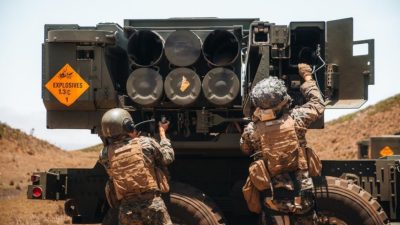WSJ: US Secretly Limited Range of Weapons Sent to Ukraine

All Global Research articles can be read in 51 languages by activating the Translate Website button below the author’s name.
To receive Global Research’s Daily Newsletter (selected articles), click here.
Follow us on Instagram and Twitter and subscribe to our Telegram Channel. Feel free to repost and share widely Global Research articles.
***
The Department of Defense secretly altered the most advanced weapons systems the US has transferred to Ukraine. The change prevented the platform from firing long-range munitions, according to the Wall Street Journal.
The White House has sent 20 High Mobility Artillery Rocket Systems (HIMARS) to Ukraine over the past six months, out of a total of 38 units authorized for Kiev. Without telling their Ukrainian counterparts, the Pentagon outfitted the systems with a component to prevent them from firing munitions with a range of over 50 miles.
President Joe Biden has sent thousands of Guided Multiple Launch Rocket System (GLMRS) rockets to Ukraine with a range of 50 miles. However, Kiev has repeatedly requested the longer-range Army Tactical Missile System (ATACMS), which can strike targets nearly 200 miles away. Both munitions can be fired from the HIMARS platform.
The Biden administration has said it will not transfer rockers with a range longer than 50 miles out of concern the munitions will be used for attacks on Russian soil. Ukraine has offered the White House control over selecting targets in an effort to alleviate US concerns, but Washington apparently has yet to budge on the issue.
The Journal spoke with American officials who said the Biden administration fears that sending longer-range munitions will escalate the war. Some NATO members, such as Latvia, have disagreed with Biden’s decision and urged him to supply the weapons, arguing it is unwise to let Russia determine Western policies.
“We should allow Ukrainians to use weapons to target missile sites or air fields from where those operations are being launched,” Latvian Foreign Minister Edgars Rinkevics said on the sidelines of last week’s NATO summit, adding that allies “should not fear” retaliation by Moscow.
Additionally, the US officials said the modification for the HIMARS indicates distrust between Washington and Kiev. “[The alterations] reflect apprehensions among administration officials that their Ukrainian partner might stop keeping its promise not to strike Russian territory with US-provided weapons,” the Journal added.
*
Note to readers: Please click the share buttons above. Follow us on Instagram and Twitter and subscribe to our Telegram Channel. Feel free to repost and share widely Global Research articles.
Kyle Anzalone is news editor of the Libertarian Institute, opinion editor of Antiwar.com and co-host of Conflicts of Interest with Will Porter and Connor Freeman.
Featured image is from The Libertarian Institute

